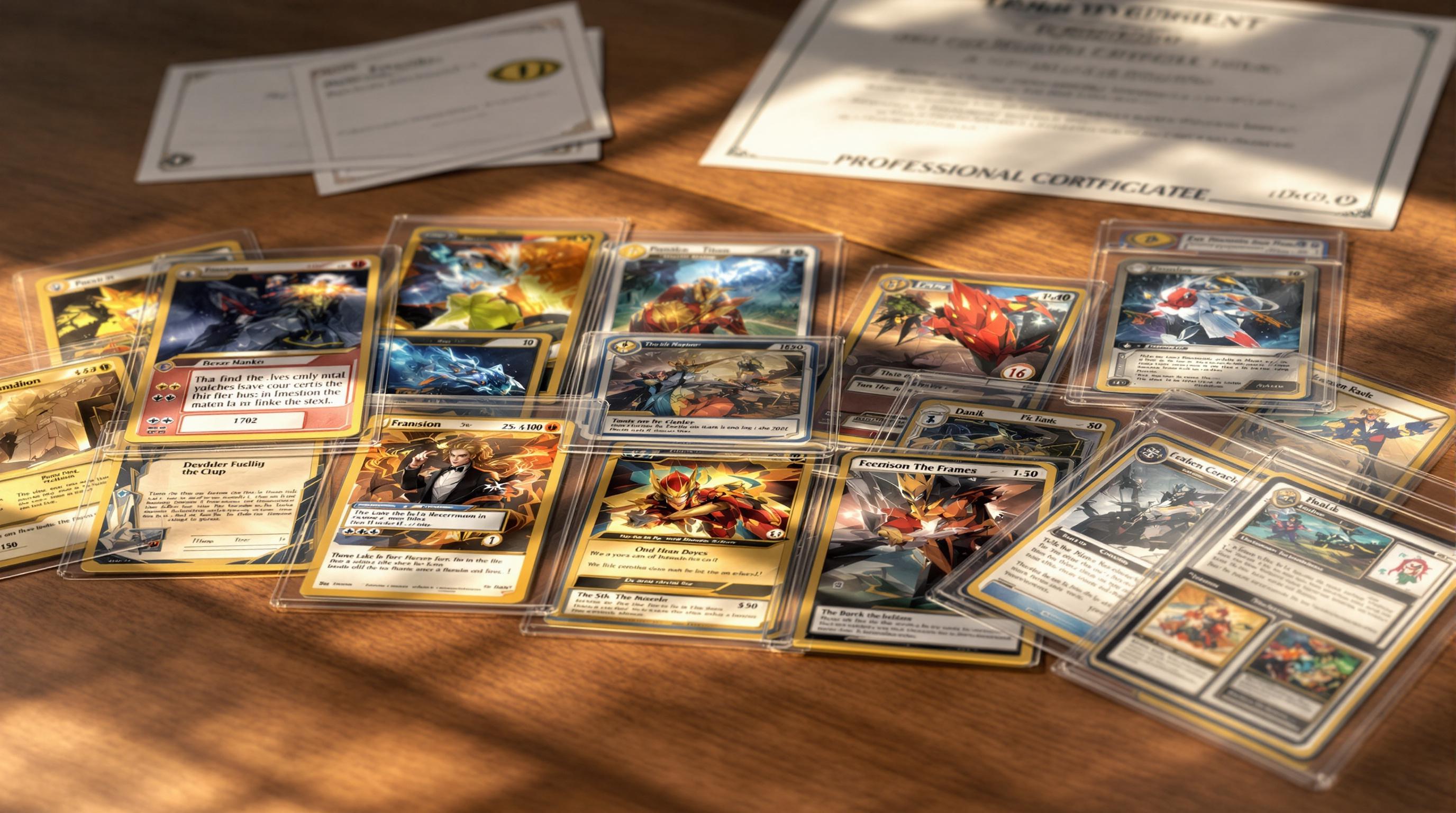Looking to buy sports cards without getting scammed? Here's how to find trustworthy dealers:
- Check business details (BBB rating, years active)
- Read customer reviews across multiple platforms
- Understand card grading methods (PSA, BGS, SGC)
- Review store policies (returns, shipping)
- Examine card condition standards
- Ask other collectors for recommendations
Quick Comparison of Key Factors:
| Factor | Good Sign | Red Flag |
|---|---|---|
| BBB Rating | B or higher | Below B |
| Years in Business | 5+ years | New or unclear history |
| Customer Reviews | Mostly positive | Lots of negative feedback |
| Grading Knowledge | Uses major services | Doesn't understand grading |
| Return Policy | Flexible for issues | "All sales final" always |
| Card Descriptions | Detailed, honest | Vague or overly positive |
| Collector Feedback | Recommended | Bad reputation |
Remember: If a deal seems too good to be true, it probably is. Do your homework and trust your gut when buying sports cards.
Look Up Business Details
When searching for trustworthy sports card dealers, start by checking their business credentials. It's like scouting a player before adding them to your team - you need to know what you're getting into.
Here's how to do a quick background check on potential dealers:
BBB Rating: The Better Business Bureau (BBB) is your go-to resource. They rate businesses from A+ to F based on things like complaint history and transparency. An A+ rated dealer has likely been around for a while and knows how to handle customer issues.
Business Registration: Make sure the dealer is officially registered. Most states have online databases for this. It's a simple way to tell the pros from the amateurs.
Licenses and Permits: Dealers might need specific licenses depending on where they operate. While there's no universal "sports card dealer license", they should at least have basic business permits.
Years in Business: Generally, the longer a dealer has been around, the more reliable they are. A dealer who's been in the game since the 1980s baseball card boom has probably seen it all.
Physical Location: Online dealers can be legit, but having a real store adds credibility. If you can, visit in person to check out their inventory and operations.
Here's a quick checklist to help you evaluate a dealer:
| Check Point | Why It Matters | Red Flag |
|---|---|---|
| BBB Rating | Shows trustworthiness | Rating below B |
| Business Registration | Proves legal operation | Not registered |
| Years Active | Indicates experience | Less than 2 years |
| Physical Store | Adds credibility | Online only, no address |
| Customer Reviews | Shows real experiences | Mostly negative or none |
Keep in mind, even established businesses can have issues. The PSA Dealer Directory is helpful, but it doesn't guarantee a dealer's reliability. As PSA states:
"Neither PSA, nor its parent or affiliates make any representations or warranties regarding the qualifications or suitability of any dealer listed in the Dealer Directory."
So use these checks as a starting point, not the final word. In the sports card world, a bit of detective work can save you a lot of headaches down the road.
2. Read What Others Say
Finding trustworthy sports card dealers? Other collectors' experiences are gold. Here's how to use reviews and ratings to your advantage.
Reviews give you the real scoop on dealers. They show you:
- If the cards are as good as promised
- How the dealer treats customers
- Their shipping game
- Whether prices are fair
Don't just stick to one review site. Check out:
- eBay feedback
- Google Business reviews
- Trustpilot
- BBB (Better Business Bureau)
- Forums like Blowout Cards or Freedom Cardboard
When you're reading reviews, keep an eye out for these:
| Good Signs | Watch Out For |
|---|---|
| High ratings across the board | Lots of bad reviews |
| Quick responses to customers | People saying cards aren't as described |
| Fair prices | Slow shipping or cards arriving damaged |
| Detailed card descriptions | Dealer ignoring customer problems |
Let's look at Game Card Shop as an example:
- 4 out of 5 stars overall
- 7,511 people have reviewed
- 78% gave 5 stars
- 10% gave 1 star
Seems pretty good, right? But don't ignore those 1-star reviews. Read both the good and the bad to get the full picture.
Here's what some happy customers say:
"Great Service. What impressed me was the instant replies to my inquiries. Instead of waiting days the reply was within a few minutes, great. Due to my old age and forgetfulness, I appreciated their prompt and polite service. Highly recommended." - Customer, October 30, 2024
But check out this not-so-happy review:
"I am shocked that so many sellers are actually allowed to down right falsify, over-inflate prices and when I contact them asking a specific question they do not even know what they are are talking about. It's sellers like that, that ruin sellers like us." - Anonymous, eBay Seller
This shows why it's crucial to find dealers who know their stuff and price fairly.
Here's a tip: Look for dealers who sell tons of cards. If they're moving hundreds or thousands of cards each week, they probably know the market inside and out.
3. Check Card Grading Methods
Understanding card grading is key to spotting reliable sports card dealers. Here's what you need to know:
The Big Three in Grading
Three companies dominate the sports card grading industry:
| Company | Scale | Standout Feature |
|---|---|---|
| PSA | 1-10 | Highest resale values |
| BGS | 0-10 (half-point) | Detailed subgrades |
| SGC | 0-10 (half-point) | Fast turnaround |
Why Grading Matters
Grading isn't just about numbers. It:
- Authenticates the card
- Assesses condition
- Protects it
- Can boost value
For example: A PSA 9 Tom Brady rookie card sold for $135,000, while a BGS 9 went for $113,000. That's a $22,000 difference just from the grading company!
Spotting Good Grading Practices
Look for dealers who:
- Use PSA, BGS, or SGC
- Are open about their grading process
- Stick to one grading service
- Know the differences between grading companies
- Price cards fairly based on grades
AI Grading: The New Kid on the Block
Some dealers now use AI-powered grading services like AGS. It's new and promising, but not as widely accepted yet.
| Feature | Traditional (e.g., PSA) | AI (e.g., AGS) |
|---|---|---|
| Process | Human evaluation | 100% AI |
| Pros | Established reputation | No human bias |
| Cons | Potential human error | Less established |
| Cost | $15 - $500+ | $14 - $50 |
The Bottom Line
A good dealer knows their stuff about grading and uses reputable services. They should explain grades clearly and price cards accordingly. If they can't or won't talk about grading, watch out.
"Always ask about the grading process. A good dealer will be happy to explain and might even teach you something new about card condition." - Veteran Collector
Remember: Grading can make or break a card's value. Choose dealers who take it seriously.
sbb-itb-0db97a5
4. Review Store Policies
Don't skip checking store policies when looking for trustworthy sports card dealers. These rules can make your buying experience smooth or frustrating. Here's what to look for:
Payment Terms
Most good dealers use safe payment methods. PayPal is common because it protects buyers. If something goes wrong, you can dispute the transaction.
Shipping Methods
Reliable dealers take card safety seriously. They should offer:
- Tracking for all shipments
- Insurance for valuable cards
- Strong packaging to avoid damage
Return Policies
This is where things get tricky. Many dealers have strict return policies because of how the sports card market works. Here's what to watch for:
| Policy Aspect | Good Sign | Bad Sign |
|---|---|---|
| Inspection Time | 3+ days | Less than 24 hours |
| Returns Allowed | For condition issues | "All sales final" always |
| Return Shipping | Shared cost | Buyer pays everything |
Let's look at a real example. Wayne's Sports Cards and Collectibles says:
"If you have any issues with your order, we'll work with you to fix it. Just contact us, and we'll be happy to help!"
This flexibility is good. But they also say all sales are final because of market changes. This is normal in the industry, but it means you need to be extra careful before buying.
Special Rules
Some stores have unique policies:
- Clearance items often can't be returned
- Special event purchases might have different rules
- Trading cards are usually non-returnable
Always read the details. If something's not clear, ask questions before you buy.
5. Check Card Condition Standards
How dealers handle and describe their cards tells you a lot about their standards. Let's dive into what to look for.
Storage and Handling
Good dealers protect their cards like they're made of gold. Here's what you want to see:
- Cards in sleeves (no scratches, please!)
- Expensive cards in hard top loaders
- Clean, organized storage (no sun, no moisture)
If you see loose cards, bent corners, or obvious damage? Run for the hills.
Grading Standards
Trustworthy dealers use real grading scales. The PSA 1-10 scale is the big one:
| Grade | What It Means | What to Look For |
|---|---|---|
| 10 | Perfect | Almost dead-center, sharp corners |
| 9 | Nearly Perfect | Slightly off-center, one tiny flaw allowed |
| 8 | Really Good | A bit more off-center, maybe slightly frayed |
| 5 | Okay | Noticeably off-center, visible wear |
| 1 | Beat Up | Rounded corners, major discoloration |
Detailed Descriptions
Good dealers tell it like it is. They'll mention:
- How well-centered the card is
- Corner and edge quality
- Surface condition
- Any damage or alterations
Wayne Wagner from Wagner's Sports Memorabilia says, "If a dealer won't talk about flaws, walk away."
Handling Practices
Watch how they handle cards:
- Gloves for expensive cards?
- Careful packaging?
- No touching the surface?
Authentication Awareness
Smart dealers know their stuff about authentication:
- They know the big grading services
- They can spot fakes or altered cards
- They'll suggest grading for valuable cards
Real-World Example
In 2021, PWCC Marketplace (a huge auction house) got kicked off eBay for allegedly trimming cards. It shows why you need to deal with honest sellers who care about card condition.
6. Ask Other Collectors
Want to find trustworthy sports card dealers? Tap into the knowledge of experienced collectors. Here's how:
Online Forums and Communities
Sports card forums are packed with valuable info. Take SportsCardForum, for example:
- Read dealer reviews in existing threads
- Post your own questions about reputable dealers
- Check user feedback on transactions
Local Card Shows and Meetups
Nothing beats face-to-face connections. At local events, you can:
- Chat with seasoned collectors about their go-to dealers
- Watch how dealers handle cards and interact with customers
Social Media Groups
Facebook, Twitter, and Instagram are hotspots for collector communities:
- Join Facebook groups like "Sports Card Collectors"
- Follow #SportscardTwitter on Twitter
- Check out collection showcases on Instagram
In these spaces, don't be shy. Ask for dealer recommendations and engage with active collectors.
Trusted Collector Testimonials
Experienced collectors often have a list of dealers they swear by. Here's a snippet from a SportsCardForum member:
"Successful transactions with: Natswin2019, ParachromBleu, Cmount76, theuclakid, tiger8mush, shammus, jcmtiger, oldjudge, coolshemp, joejo20..."
Lists like these can point you towards reliable dealers.
Online Directories
Websites like Card Shops List can help you find local sports card shops. Just remember: being listed doesn't guarantee reliability. Use these directories as a starting point, then dig deeper.
Conclusion
Spotting reliable sports card dealers isn't rocket science, but it does take some know-how. Here's what you need to keep in mind:
Do your homework. A dealer with a BBB rating of B or higher and a few years under their belt is usually a safe bet.
Listen to what other collectors are saying. Check out reviews on eBay, Google, and collector forums. They can tell you a lot about a dealer's reputation.
Get to know grading. Good dealers use well-known grading services like PSA, BGS, or SGC. They should be able to explain how grading works and price cards accordingly.
Read the fine print. Look for clear policies on payments, shipping, and returns. Flexible approaches, like those of Wayne's Sports Cards and Collectibles, are a good sign.
Pay attention to how dealers handle cards. Trustworthy ones take care of their stock and give honest descriptions of card conditions.
Talk to other collectors. They're a goldmine of information. Join forums, go to local events, and check out social media groups.
And remember, if a deal looks too good to be true, it probably is. As Wayne Wagner from Wagner's Sports Memorabilia puts it:
"If a dealer won't talk about flaws, walk away."
Here's a quick way to size up a dealer:
| Good Sign | Red Flag |
|---|---|
| 5+ years in business | New or unclear history |
| Positive reviews across platforms | Lots of negative feedback |
| Uses major grading services | Doesn't know grading |
| Clear, fair return policy | "All sales final" with no exceptions |
| Detailed card descriptions | Vague or overly positive descriptions |
| Recommended by other collectors | Bad rep in collector circles |


